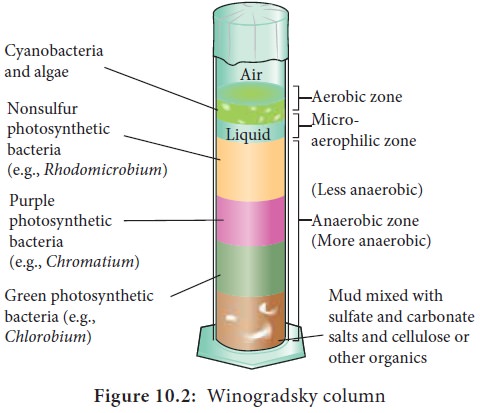Chapter: 11th Microbiology : Chapter 10 : Soil Microbiology
Pioneers of Soil Microbiology
Pioneers of Soil Microbiology
Scientists studied the microorganisms from water, air and soil.
They recognized the role of microorganisms in natural processes. They realized
the importance of soil microorganisms in growth and development of plants. Soil
Microbiology emerged as a distinct branch of soil science during first half of
the 19th century.
Sergei N. Winogradsky discovered the autotrophic mode of life
among bacteria and established the microbiological transformation of Nitrogen
and Sulphur. He isolated nitrifying bacteria for the first time and
demonstrated the role of these bacteria in nitrification (1890). Further he
demonstrated that free-living Clostridium
pasteurianum could fix atmospheric Nitrogen (1893). He developed the
Winogradsky column (Figure 10.2), a self contained ecosystem for studying the Sulphur
cycle. Therefore, he is considered as the 'Father of Soil Microbiology'.

M. W. Beijerinck (1888) isolated root nodule bacteria in pure
culture from nodules in legumes and named them as Bacillus radicola. Thus, he is considered as the 'Father of Microbial ecology'.
Beijerinck and Winogradsky (1890) developed the enrichment culture technique for isolation of soil organisms, proved independently that transformation of nitrogen in nature is largely due to the activities of various groups of soil microorganisms (1891). Therefore, they are considered as 'Pioneers in Soil Bacteriology'.
Related Topics